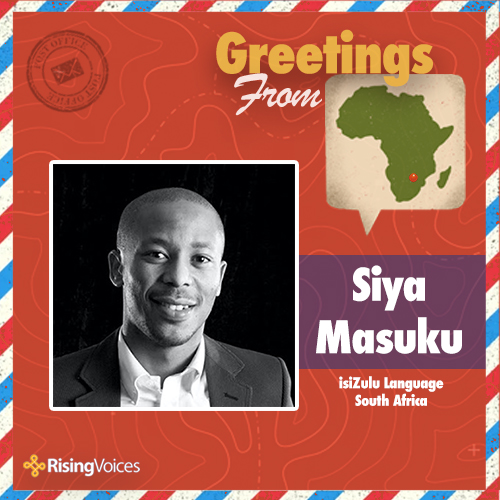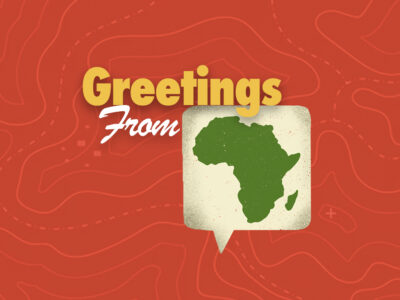
Rising Voices invites you to join us for the 3rd in the 5-episode “audio postcards” series “Greetings From…” series, featuring the voices of African language digital activists from South Africa, Nigeria, and Ghana.
In this third episode, we explore the personal narratives of Siya Masuku in his own words.
Special thanks to producer Malcolm Bamba, whose collaboration with each activist has brought forth these compelling stories. Through his work, listeners will embark on a journey, gaining insights into the origins of each activist's digital engagement with their language. Additionally, this series sheds light on the challenges they confront and their ongoing motivation for their work.
The spotlight of the third episode shines on Siya, whose work revolves around online book publishing in the isiZulu language of South Africa. Rising Voices interviewed Siya in this earlier blog post about his work, and you can follow along the audio with its transcript below.
Download the audio file here
Malcolm Bamba (MB): Hello everyone, I'm Malcolm Bamba and welcome to Rising Voices Presents “Greetings from..”, a series which follows language activists from across the globe sharing their stories of preservation in a digital age. In this episode, language activist Siya Masuku shares his experience digitizing the isiZulu language of South Africa. Here is his story.
Siya Masuku (SM): Hello, sanibonani. My name is Siya Masuku. Born and raised in Soweto. I work and live in Johannesburg, South Africa as a member of AmaZulu, the Zulu people. My work advocates for the isiZulu language, one of South Africa's 12th officially recognized languages.
In South Africa, we have at least 35 Indigenous languages, 12 of these are official, and they include South African Sign Language. I was unimpressed with the established booksellers, who hardly stocked literature in Indigenous languages in my country. If ever they do stock books in Indigenous languages, they are located in a very small section. Furthermore, these books tend to be authored by people who are not from the same background as the speakers of the language. The root problem was the difference in infrastructure, a by product of crimes committed against humanity, mainly racism. A change was needed and the responsibility lay on a lot of people, including myself. In other words, it is the responsibility of AmaZulu to make sure that there is a growing number of isiZulu books being published all the time.
After sharing my concerns with family, friends and colleagues, I realised that most of us agree that the problem is here to stay unless someone or a group of people becomes deliberate about change. After a chat with my mother, a teacher at Emseni Primary School, which is located in Soweto, I had the crazy idea that I could write, draw and design an isiZulu picture book for children and self-publish it. The end product was an alphabet book that teaches the pronunciation of isiZulu words using rhyme.
SM: I use linocut and various media to illustrate the animals for each letter, a process that took all of 2015. Next, to make the book accessible to the children, I knew my type of book wouldn't be considered for publication by mainstream publishers. I also wanted to have a final say on how the book gets printed and sold. I wanted my own publication company and opportunities to partner with peoples and others who share similar interests.
Since the beginning of 2016, I had set up meetings with business people I could reach. I was determined to raise 30,000 rand to print 1000 books. I received mixed reactions along the way. Somehow I would manage to get a lead from one meeting to the next. I was running out of money fast. By the end of May, I was still determined to publish the book and in one of my fundraising meetings a mentor suggested I consider online crowdfunding. Crowdfunding was not popular in South Africa in 2016. Europe had the market and as a result catered for the dollar, pound, and euro currencies. I couldn't see how AmaZulu will trust an isiZulu book sold in foreign currencies, regardless of the author.
Eventually, I stumbled upon a local crowdfunding organisation. I opted for 30 days in order to raise 30,000 rand as a minimum goal. Crowdfunding can rely heavily on one's popularity. It is a roller coaster ride. You wake up, you show your digital community what you have done and what can be done. One week away till the end of June, the campaign had raised just over 25,000 rand. At the rate the campaign was going.
SM: I was convinced we could never raise 5000 rand in less than seven days. With the first week of July 2016, I received a call from a foreign number. The person on the other side introduced himself and explained that he is a South African who works in the DRC. He saw the campaign after reading an article. He told me he was willing to fly out the DRC to meet me anywhere in South Africa.
A few days later, we met at a restaurant on Vilakazi Street, Orlando. He ordered a bottle of wine and asked me what I'd like to drink. I told him I'd prefer to speak about the campaign first. He responded by saying that the campaign was over. He had transferred 150,000 rand the day before he left the DRC. It was a dream come true. I went to bed satisfied that evening. I remember waking up with excitement. I couldn't wait to tell everyone the good news, starting my own publishing house, Siyafunda online and publishing my first book Siyafunda isiZulu was now a reality. I wanted to see the faces of the children when they held the book for the first time. I also remember being anxious as I realized the responsibility the whole project presented. I felt the need to improve. I wanted to become a better person, to myself and to my community, to live and practice the true meaning of the phrase. One hand washes another, as we say in ngesiZulu, Izandla ziyaghezana.
MB: Thank you for listening to Rising Voices audio postcard series. For more information on the language activists featured in this episode, visit rising.globalvoices.org or follow us at @DigiAfricanLang on X (formerly known as Twitter). I'm Malcolm Bamba and I will see you in the next episode.

